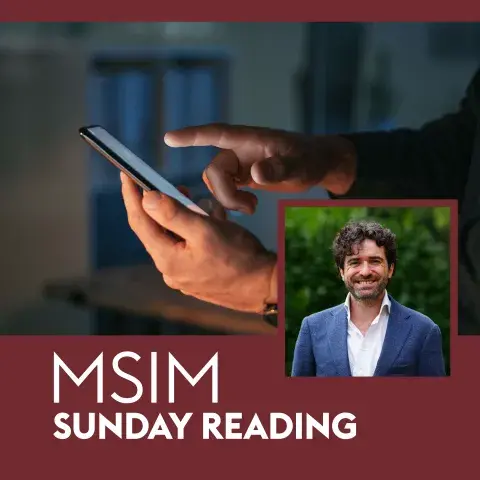
MSIM Sunday Reading is a weekly publication highlighting a current and relevant topic chosen by a professor of the Master of Science in International Management for their courses. The Franklin community gets an inside look at the coursework and specializations offered at MSIM and expert commentary on international issues affecting our world today. This week's MSIM Sunday Reading is in conversation with Andrea Quartarone, Adjunct Professor of Digital Entrepreneurship and Digital Transformation at Franklin. His article explains the difficult task of defining “digital transformation” in a universal way and the implications of this difficulty, a topic addressed in his Digital Transformation course.
About Professor Andrea Quartarone
Andrea Quartarone, Italian, is a television writer/producer, storytelling consultant, and teacher. He is an academic fellow for Television and Television Cultures courses at Bocconi University and for Arts and Digital Media class at SDA Bocconi School of Management. At Franklin University Switzerland, he is an adjunct professor of Digital Entrepreneurship and Digital Transformation.
Digital transformation is a complex process that can provide unprecedented opportunities for the business of companies and institutions. But these opportunities come with a long series of big challenges that sometimes make the transformation difficult or ineffective. One of these central challenges lies at the very beginning of the process: the very definition of digital transformation.
The issue is easy to understand. Digital transformation is such a broad, deep, pervasive process that it’s hard to define under a single, unanimously agreed upon definition. Surely, a unified definition would be useful for the sake of general clarity, but would it be possible to even formulate a universal definition of it?
To get to the heart of the matter, some of the main definitions could be mentioned and analyzed. One of the most diffused has been designed by George Westerman (Emhaiser), and it’s about digital transformation as a “radical rethinking of organizations” in order “to radically change business performance” – the “radicality” issue is here properly stressed: digital transformation is disruptive by definition. The one provided by a McKinsey article puts great emphasis on the process as a “fundamental rewiring of how an organization operates,” mentioning the competitive advantage of, improving of customer experience and the lowering of costs – specifying further the implications for the business performance that Westerman references. IBM underlines the need for a “customer-driven, digital-first approach” – two of the main pillars of digital transformation you can’t improve upon without it. Deloitte’s definition involves very explicitly the notion of value for “employees, customers and shareholders”, broadening the nature of digital transformation outcomes and making it clear that the benefits can impact people inside and outside the company or institution.
All these definitions are correct, and they all reflect the specific approach to the matter of the person or company that has formulated it. To arrive at a unified, universal definition of digital transformation, a synthesis of all the elements mentioned (plus some others) could be very difficult but doable. The problem is that it would be mostly useful on a theoretical level because on a practical one, every company or institution is a case in and of itself, and it has its own specifics (and the involvement of too many variables could compromise the orderly and perfect internal execution of the transformation). And this could explain the variety of definitions in the field.
At the end of the day, instead of looking for a universal definition of the phenomenon, could it be more effective for companies and institutions to ask themselves which kind of business they want to run and to be in the long-term? And starting from that, formulate their own vision about the digital transformation through a customized process of selection and prioritization of all the issues involved in the process?
As addressed in the Digital Transformation course in the MSIM: yes, it is better, and it’s important to understand that—given all these premises—any company or institution throughout the whole organizational chart, from top to bottom, has to define their unique digital transformation definition to be shared at any level as a fundamental part of their digital strategy. A proper, company- or institution- specific definition of it will produce a proper, shared and comprehensive vision, that will act as a (customized) strategic compass for the whole process in the years to come. Students in the program will deal with different cases and applications (such as the Lego or the Sky ones) to face the complexity of digital transformation and understand how different businesses are interpreting it.
Emhaiser K., “Digital transformation disruption : What is it? What is the Opportunity? What is the Threat?”, 2019
Deloitte, What is digital transformation?, 2023
IBM, What is digital transformation?
McKinsey, What is digital transformation, 2023

